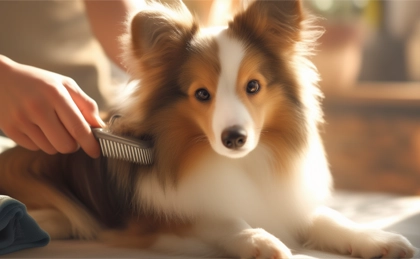If you're considering a new family dog, the Sheltie may well have caught your eye. This small energetic breed has a thick double coat and a charming personality.
However, Shelties do have certain characteristics that may not make them ideal for all families. Here's a closer look at the most important factors to consider when deciding if a Sheltie is the right breed for you.

Are Shelties Good Family Dogs?
Shelties vs Children
Here's what you need to know about Shelties interacting with children, particularly young children who are more likely to overstep a dog's boundaries.
Shelties are playful and energetic. This makes them great companions for children who also have endless energy and want to play and run around together.
Shelties are easy to train. The opportunity for your child to train their own dog has immense value. They can practice trust, patience, and discipline while enjoying the mutual bond that comes from communicating with an animal.
Shelties enjoy social stimulation. A well-adjusted Sheltie isn't intimidated by the bounciness and loudness of children, and may even join in and make just as much noise.
Shelties are dainty dogs. Underneath all that fur, Shelties can be quite dainty dogs so it's important that children are taught to be gentle in their physical play.

The Mahogany Sable Sheltie.
Do Shelties Chase Children?
One common concern among parents is whether or not an individual dog gets along with children. Shelties, in general, are known to be good with children. They're typically very gentle and affectionate, and can form strong bonds with their human family.
However, like any dog breed, each individual Sheltie has his own personality and temperament, and may have a history of being neglected or abused that could affect how he behaves around humans. If you're adopting an adult Sheltie, introduce him to your children in a calm and controlled manner, and supervise all early interactions.
It's worth noting that Shelties were originally bred to herd sheep—and they retain a strong herding instinct today. This may drive them to herd (basically chase) children when they run, and possibly even nip at their heels. With proper training and socialization, unwanted herding and chasing behaviors can be minimized.
Some kids find herding all good fun, while others are just plain scared. Never encourage a Sheltie to herd your children and, ideally, train it out of them at an early age.

Shetland Sheepdogs love to run and chase.
Are Shelties Nippers?
As mentioned, the herding instinct can drive a Sheltie to nip, especially in high-energy situations when they're very excited about a particular target.
Fortunately, it's easily trained out with clear boundaries and rules for your Sheltie from the outset. Nipping should be met with a firm "NO", and brief withdrawal of attention. Provide positive reinforcement when your Sheltie takes the right action.
Consistency is key with dog training, while puppy socialization can help reduce nipping tendencies and ensure your Sheltie becomes a well-mannered member of the family.
Do Shelties Bark a Lot?
Like many small dog breeds, Shelties can be extremely vocal and have a natural tendency to bark. They have a sharp and alert nature which makes them excellent watchdogs but also means they bark to alert their family to any perceived intruders. Excessive barking can be a real issue if not addressed early on.
To manage excessive barking in Shelties, give them proper mental and physical stimulation. Regular exercise, playtime, and training sessions can help keep your Sheltie mentally and physically stimulated, reducing the likelihood of boredom-induced barking.
What's more, training your Sheltie to respond to commands like "no bark" or "shhh!" can help control their barking. It's essential to use positive reinforcement methods in your training, such as treats or praise, and never shout at or hit a dog to punish him.
Can Shelties Run Fast?
Shelties are certainly known for agility and speed. They are small, swift and agile, making them excellent competitors in dog sports like agility, obedience, and herding trials. They have a natural ability to navigate obstacles with ease thanks to their herding instincts and high energy levels.
If you have an active family that enjoys outdoor activities such as hiking or running, a Sheltie can be a great companion. They love to be active and thrive on physical exercise and mental stimulation. Regular exercise and playtime are crucial for their physical and mental well-being, and they will be happy to join you on your adventures.
How Often Do You Have to Brush a Sheltie?
Shelties have a beautiful double coat comprising a soft, dense undercoat and a long, rough outer coat. The whole outfit requires weekly grooming to keep it in good condition, remove dead fur, and keep the skin healthy. Shelties shed moderately throughout the year with heavier sheds at the start of summer.
To keep your Sheltie's coat healthy and tangle-free, take a look at my guide How to Groom a Shetland Sheepdog. Use a detangler with long teeth to get right into the thick of it, draw out loose fur, and eliminate tangles.
In addition to regular brushing, Shelties need occasional trimming of the fur around the paws and hindquarters. If you're not comfortable with grooming your Sheltie yourself, take her to a professional groomer to keep her coat in good condition.
How Long Do Shelties Live?
The average lifespan of a Sheltie is 12 to 14 years, which is pretty good compared to some other dog breeds but, of course, never long enough. With proper care, Shelties often live well into their senior years, but like humans, are ultimately prone to losing their sense of hearing and eyesight.
In terms of genetic diseases, Shelties can sometimes be vulnerable to hip dysplasia, kneecap dislocation, Collie eye, and Collie nose. To find out if your Sheltie has a genetic disease, you can perform an at-home Dog DNA Test which involves taking a cheek swab and mailing it to the lab. In return, you get a detailed report on her susceptibility to 210+ genetic health conditions, drug sensitivities, and blood disorders.
Regular veterinary care, including routine check-ups, vaccinations, and dental care, can help prevent or manage common health issues in Shelties. Provide a healthy diet, regular exercise, and mental stimulation to give your dog the best life possible.
Is a Sheltie Right for Your Family?
Naturally, I'm convinced that Shelties can make excellent family pets but you really need to be on top of daily dog walks, weekly grooming sessions, and be resilient to barking around the house at times. Here are the take-home points:
Shelties have moderate-to-high energy levels. This means walking them every day for 60 minutes or more to give them sufficient exercise and mental stimulation. If you have an active family that enjoys outdoor activities, you'll make a great fit. However, if your family has a sedentary lifestyle, a Sheltie will become bored and restless, which is just sad and leads to behavior issues.
Shelties have strong herding instincts. Shelties have a quick energy and love to herd, resulting in spontaneous chasing, nipping, and running at any fast-moving people or animals. While you can always train a Sheltie to be well-behaved, but it takes effort and consistency on your part. In some cases, the challenge may be too much.
Shelties have high grooming needs. The thick double coat requires regular brushing and occasional trimming. Even with routine brushing, Sheltie owners still have to deal with some degree of fluff on the furniture and floors. If your family can't commit to at least one hour a week grooming, a Sheltie may not be the best choice.
Shelties have strong barking tendencies. Shelties are vocal dogs and can bark, whine, or vocalize in various ways to communicate or express their emotions. If your family lives in an apartment or in close proximity to neighbors who are sensitive to noise, a barking Sheltie may get you into trouble. On the upside, correct training and management is effective at reducing barking in Shelties.
Shelties need a moderate-to-high time commitment. Shelties thrive on human interaction and can suffer from separation anxiety if left alone for long periods of time. If your family has a busy schedule or you're out of the hours for more than a few hours every day, a pet Sheltie will likely become stressed and develop destructive behaviors.
Shelties are moderately compatible with children. Shelties can do very well with children and other pets if they're properly socialized from an early age. However, an anxious or maladapted Sheltie may react to the sudden and unpredictable behaviors or children with barking, herding, nipping, and in serious cases, aggression.
Final Thoughts
Once you've taken all those cautions on board, know that Shelties do make wonderful family pets in many circumstances. They're intelligent, active, and loyal dogs who thrive on our companionship. With proper care, they can be exceptionally loving and well-behaved lap dogs who never fail to impress with their delicate sensitivity.
If you have an active family willing to provide routine exercise, mental stimulation, and grooming, while being able to train or tolerate some herding and barking, a Sheltie can be a great addition. If you choose to adopt a Sheltie, please find a Sheltie rescue near you or look up an ethical Sheltie breeder. Never, ever buy from puppy mills, puppy farms, or anonymous online listings.

How to Groom a Sheltie

The Best Brushes for Shelties

Caring for a Sheltie








